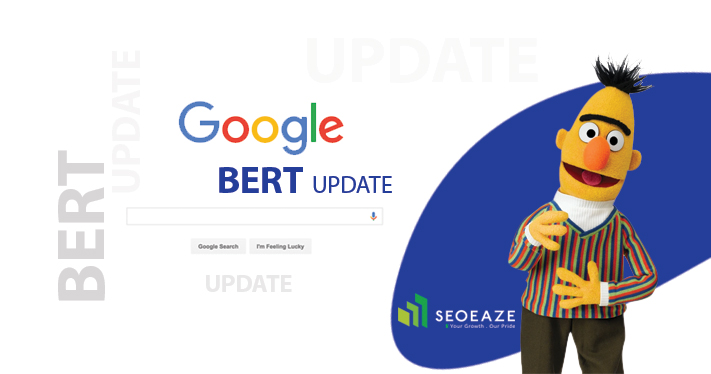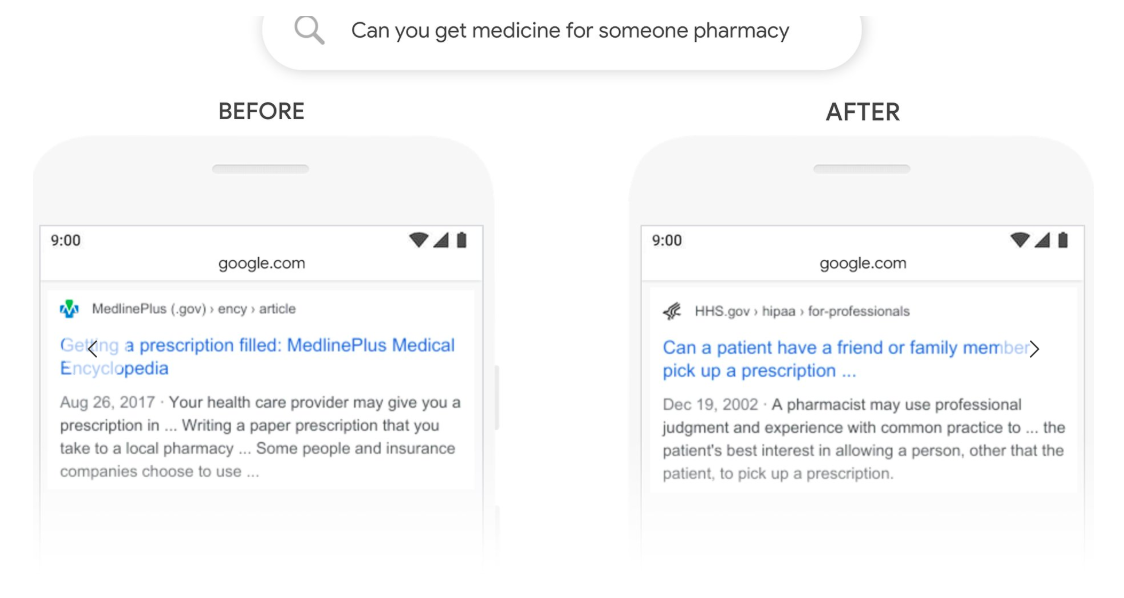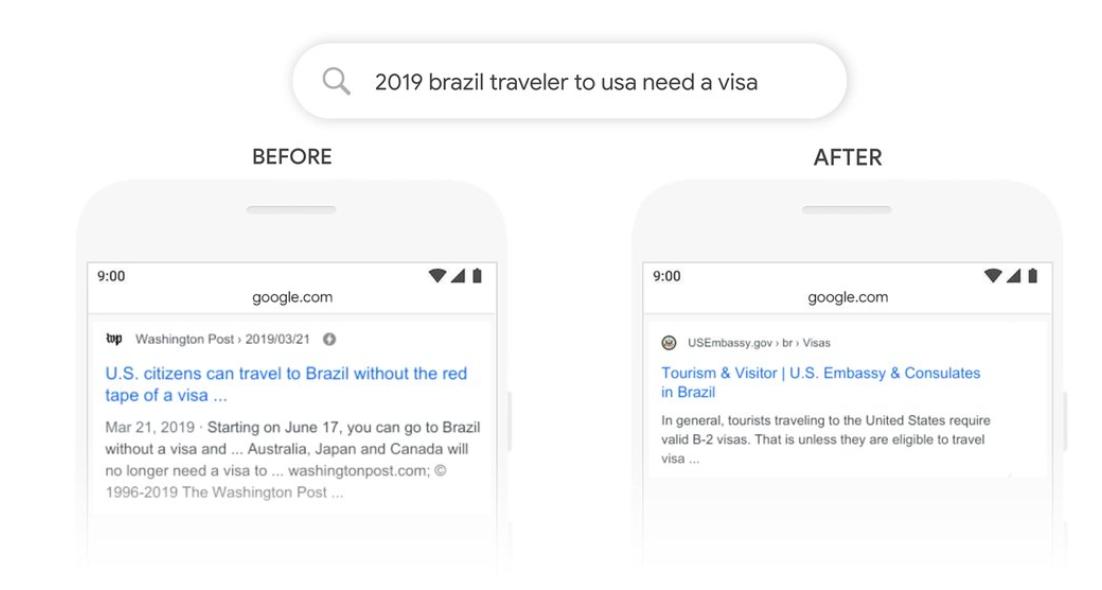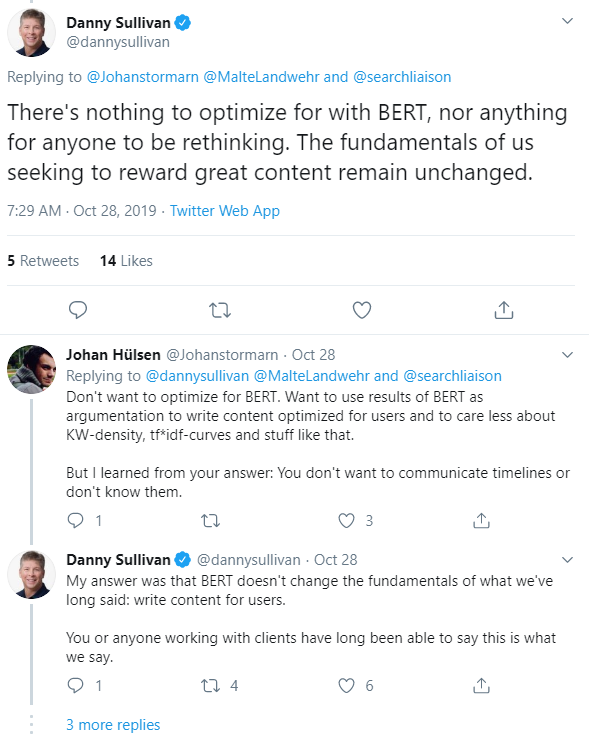Last Updated on December 14, 2019
Keeping track of Google’s updates is no joke, rather it’s a fulltime job requiring you to keep on your toes given the frequency of updates. No matter how many updates are released they all focus on one of benefiting websites that produce quality and fresh content that is relevant to the audience.
In the recent assault on irrelevant websites, Google has recently introduced a new update it is calling BERT.

The Google BERT Update
Google BERT is here to help the search giant understand the meaning of a word in a sentence but along with all the nuances of the context.
BERT stands for Bidirectional Encoder Representations from Transformers, and it can be easily one of the biggest updates in the last 5 years. A form of the deep learning algorithm, BERT is related to natural language processing that is going to help Google make sense most of the words.
Making sense of the context of the queries has always been a challenge for Google, but now BERT is supposed to change that. However, the idea is nothing novel and the Hummingbird update of 2013 was Google’s first attempt to understand the contextual search queries used by the searchers.
How BERT differs from The Hummingbird?
While both the updates deal with the contextual meaning of the searches, the BERT differs in how it processes and understands the natural language.
BERT is more sophisticated language model that according to Google AI Researchers, “unlike recent language representation models, BERT is designed to pre-train deep bidirectional representations from an unlabeled text by jointly conditioning on both left and right context in all layers. As a result, the pre-trained BERT model can be fine-tuned with just one additional output layer to create state-of-the-art models for a wide range of tasks, such as question answering and language inference, without substantial task-specific architecture modifications.”
What Is Google BERT Targeting?
According to Google, the BERT update is going to affect 10% of all search queries, which is an incredibly high per cent.
Still, there is not much chatter about this BERT update in the SEO community, it is because a vast majority of the focus of this update is on the “longer, more conversational queries”. Generally speaking, SEOs do not concern themselves too much about using longer tail queries, that this update entirely focuses on.
Now we already have heard a lot about search intent and how Google is actively trying to find out what the user actually wants to find from a search.
But how BERT makes a difference?
You have to understand that with a few examples.
Let’s say for example if you want to buy medicines for someone from the pharmacy and Google the same. You use the words “can you get medicine for someone pharmacy.” Here’s how Google replied to the query BEFORE BERT and afterwards:
 Before Google failed to understand the subtle nuance of the query and completely missed that the query is actually asking whether we can pick a prediction for someone else or not. But after BERT update, the search giant got better and now can make sense of the context well.
Before Google failed to understand the subtle nuance of the query and completely missed that the query is actually asking whether we can pick a prediction for someone else or not. But after BERT update, the search giant got better and now can make sense of the context well.
Here’s another example for the query “2019 brazil traveler to usa need a visa.”
 With BERT Google’s search algorithm better understands the meaning of ‘to’ and ‘need’ contextually giving a more refined search. Now on the outset, this achievement seems like a subtle understanding but from the engineering point of view, it’s a concept that can’t be easily coaxed.
With BERT Google’s search algorithm better understands the meaning of ‘to’ and ‘need’ contextually giving a more refined search. Now on the outset, this achievement seems like a subtle understanding but from the engineering point of view, it’s a concept that can’t be easily coaxed.
BERT application to both rankings as well as the featured snippets, Google appears to have garnered a better understanding of queries helping users find useful information. In fact, in the US, BERT is going to help better understand one in 10 searches in English. In the coming days, this update will be released for more languages and locales.
Simply put, BERT is targeted longer and more conversational queries, particularly phrases where prepositions like ‘to’ and ‘for’ matter a lot to the actual meaning of the query. With this update, Google is making it easier for users to find relevant results searching the way that feels natural to them.
Particularly for longer, more conversational queries, or searches where prepositions like “for” and “to” matter a lot to the meaning, Search will be able to understand the context of the words in the query. And users can search in a way that feels natural for them.
BERT is a breakthrough in the implementation of machine learning for natural language processing. Its approachable tech will allow for fine-tuning that will have a wide range of practical applications in the future.
How to prepare or recover from BERT?
You might not actually like to read it, but there is nothing or anything that you have to do to prepare or respond to BERT update.
The reason?
Google did not create BERT to penalize or benefit certain sites.
Unlike all other updates, this Google search algorithm update is not going to target your website. If you witness a drop in traffic then it is because your website was accruing traffic from the search queries for which your webpages must not have ranked in the first place.
Good thing is that the traffic was most probably of low quality anyway. For instance, in the above-mentioned example, MedicinePlus will lose traffic from query “can you get medicine for someone pharmacy,” but the users were already using that query for information purpose and not with buying intention.
How can recover or optimize for BERT?
Just keeping focusing on creating relevant and useful content for the target audience. And if you were hit by BERT than take solace in the fact that you were not benefiting from that traffic anyway.
BERT affects SEO but nothing new need to be done that you should have done before BERT.
The very definition of SEO is, “the process of making your site better for search engines. Therefore, any update that the search engines are making to their algorithm influences the search engine optimization process.”

As Danny Sullivan advices, you need to keep up the good work and focus more on writing content for the users, rest everything else will fall into place.
Still, if you are too much concern about BERT recovery, we recommend you to identify and optimize for right user’s search intent.
BERT algorithm is trained to make sense and even predict the meaning of the second sentence in a pair to understand its context in relation to the original document. This is why it can better understand the user’s needs and even predict the right search queries.
Once you have identified the right user’s intent phrases. Create content that answers following:
Why the user is searching?
What the user is trying to achieve from the search?
Are they looking for answers or searching for a particular resource or product?
With the rise of the mobile devices and popularity of the voice search, people are getting used to fast and contextual answers to their queries. Google is trying to adapt to this shift in people’s search behavior and trying to better fit the search results with the SERP intent.
This means now even without including the exact searched phrases in your content you still can rank if you are able to successfully answer a user’s search intent. Google is only going to become better and better at determining the intent of searchers, and you need to accommodate this change in your SEO methodologies.
Optimizing for featured snippets
Featured snippets have always been about answering the searcher’s query almost instantly, not it is even more important to optimize your content for the celebrated ‘Position 0.’
If you have not already optimized your content to rank in the topmost position in Google then you need to work on optimizing exactly for the same. Now if it is too complicated for you to begin with, take baby steps.
First perform a thorough Google SERP analysis of your competitor to understand the keywords, search volumes and keywords that can work. Then create relevant and optimized content based on the same keywords. Keeping discovering more keywords and ranking opportunities to improvise the already ranking content. These are simple steps for you to follow to optimize your content for the featured snippet position.
Conclusion
The takeaway from the whole article on BERT update is: Don’t panic about this Google update or any future search algorithm updates as the priority for Google is to deliver relevant and better results to users, you follow the same rule.
That being said we are not implying that every site that lost traffic after this update deserved it, but it will be a mistake to think that you can react a certain way to overcome its impact. It’s better to be proactive than reactive in SEO, just like in real life. This is why your focus must always be on creating relevant, fresh content that caters to the needs of the user and keep the technical SEO top-notch, nothing else has to be done.
